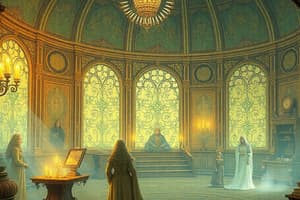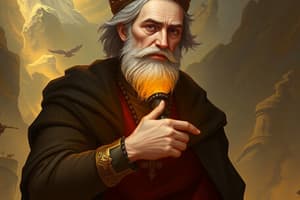Podcast
Questions and Answers
In quale città è nato Francesco Petrarca?
In quale città è nato Francesco Petrarca?
- Montpellier
- Bologna
- Firenze
- Arezzo (correct)
Quale professione aveva il padre di Petrarca?
Quale professione aveva il padre di Petrarca?
- Scrittore
- Avvocato
- Medico
- Mercante e notaio pubblico (correct)
Dopo la morte del padre, cosa ha fatto Petrarca invece di continuare i suoi studi di legge?
Dopo la morte del padre, cosa ha fatto Petrarca invece di continuare i suoi studi di legge?
- Ha aperto uno studio legale
- Ha iniziato a lavorare come mercante
- Ha iniziato a scrivere poesie
- Ha intrapreso la carriera ecclesiastica (correct)
Quanti componimenti poetici ha scritto Petrarca nel periodo dal 1327 al 1368?
Quanti componimenti poetici ha scritto Petrarca nel periodo dal 1327 al 1368?
Quale tipo di sonetto è associato a Petrarca?
Quale tipo di sonetto è associato a Petrarca?
Quando Petrarch si è impegnato nella composizione di un poema epico sulla Seconda Guerra Punica?
Quando Petrarch si è impegnato nella composizione di un poema epico sulla Seconda Guerra Punica?
Chi è stato il destinatario dell'opera epica di Petrarch sull'Africa?
Chi è stato il destinatario dell'opera epica di Petrarch sull'Africa?
In quale anno Petrarch è andato a Roma per accettare la corona di poeta laureato?
In quale anno Petrarch è andato a Roma per accettare la corona di poeta laureato?
Come la relazione con Laura de Noves ha influenzato la scrittura di Petrarch?
Come la relazione con Laura de Noves ha influenzato la scrittura di Petrarch?
Quale filosofo ha definito Petrarch come colui che ha meglio drammatizzato il vero amore?
Quale filosofo ha definito Petrarch come colui che ha meglio drammatizzato il vero amore?
Flashcards are hidden until you start studying
Study Notes
Petrarca: Early Life, Literary Career, Relationships, Influence, and Legacy
Early Life
Francesco Petrarca, commonly known as Petrarch in English, was born on July 20, 1304, in the city of Arezzo, located in central Italy, south of Florence. He was the son of Ser Petracco, a merchant and notary public. Petrarch studied law in Montpellier, France, and later in Bologna, Italy, but his primary interest was Latin literature and writing. After his father's death in 1326, Petrarch abandoned his legal studies, stating, "I couldn't face making a merchandise of my mind." Instead, he served in various clerical positions, which granted him adequate time for his writing and literary studies.
Literary Career
Petrarca's literary career began with his father's death in 1326, when he was free to pursue his own interests. He returned to Avignon and took minor ecclesiastical orders, entering the household of the influential cardinal Giovanni Colonna. Petrarch's earliest surviving poems, on the death of his mother, date from the Montpellier and Bologna period. From 1327 to 1368, Petrarch wrote 366 poems as part of a sequence, centering on the theme of his love for Laura de Noves, a woman he fixated on for the rest of his life. These poems, collected in a canzoniere or song-book, are known as Rime Sparse or Scattered Rhymes in English. Petrarch is credited with the development and popularization of the Italian sonnet, thus named the Petrarchan sonnet. In 1333, Petrarch connected with fellow Italian poet Giovanni Boccaccio and engaged in regular correspondence, including an exchange of their writings. In 1337, Petrarch visited Rome and began composing Africa, an epic poem concerning the Second Punic War, which he dedicated to Robert of Naples, king of Sicily.
Relationships
Perhaps Petrachca's most significant relationship was with Laura de Noves, a woman he fixated on from 1327 to 1368. He wrote 366 poems, mostly sonnets, about his love for Laura, who remained unrequited throughout his life. Petrarch's obsession with Laura influenced his writing and helped shape the modern Italian language through his sonnets.
Influence
Petrarch was renowned as a poet and scholar, and on April 8, 1341, he traveled to Rome to accept the crown as poet laureate. During the ceremony, he delivered his "Coronation Oration," considered the first manifesto of the Renaissance. Petrarch's influence extended beyond Italy. His work inspired others to rediscover and reconstruct their past, making him one of the fathers of the Renaissance. Petrarca's considerable influence in England began with Geoffrey Chaucer, who incorporated elements and translations of Petrarch's work into his own. Petrarch's influence on English literature lasted at least through the nineteenth century and can be found in the works of many famous English poets, including Sir Thomas Wyatt and Percy Bysshe Shelley.
Legacy
Petrarch passed away just before his 70th birthday, on either July 18 or 19, 1374, in Arquà near Padua, Carrara, Italy. After retiring to work in his study on July 18, 1374, Petrarch died during the night. As one of the world's first classical scholars, Petrarch unearthed vast stores of knowledge in the lost texts he discovered, while his philosophy of humanism helped foment the intellectual growth and accomplishments of the Renaissance. Petrarch's legacy includes his poems, sonnets, and other writings, which were immortalized when they were used alongside the works of Dante Alighieri and Giovanni Boccaccio to help create the modern Italian language. Poet J.D. McClatchy said of Petrarch, "True love—or rather, the truest—is always obsessive and unrequited. No one has better dramatized how it scorches the heart and fires the imagination than Petrarch did, centuries ago".
Studying That Suits You
Use AI to generate personalized quizzes and flashcards to suit your learning preferences.




